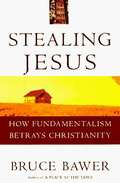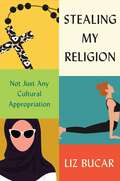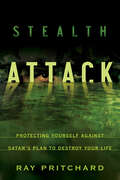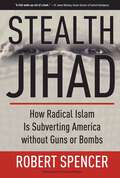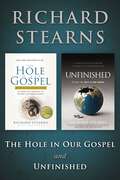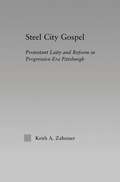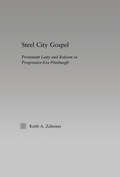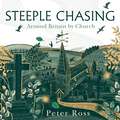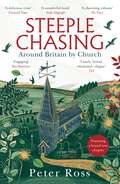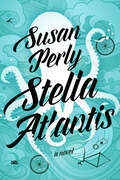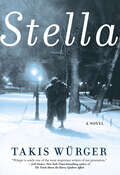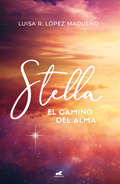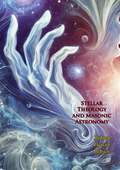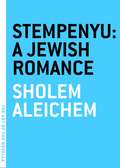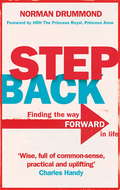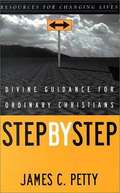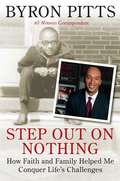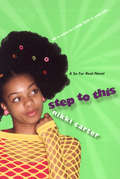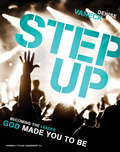- Table View
- List View
Stealing Jesus: How Fundamentalism Betrays Christianity
by Bruce BawerFrom the author of the widely acclaimed A Place at the Table, this is a major work, passionately outspoken and cogently reasoned, that exposes the great danger posed to Christianity today by fundamentalism. The time is past says Bruce Bawer, when denominational names and other traditional labels provided an accurate reflection of Christian America's religious beliefs and practices. The meaningful distinction today is not between Protestant and Catholic, or Baptist and Episcopalian, but rather between "legalistic" and "nonlegalistic" religion, between the Church of Law and the Church of Love. On one side is the fundamentalist right, which draws a sharp distinction between "saved" and "unsaved" and worships a God of wrath and judgment; on the other are more mainstream Christians who view all humankind as children of a loving God who calls them to break down barriers of hate, prejudice, and distrust. Pointing out that the supposedly "traditional" beliefs of American fundamentalism - about which most mainstream Christians, clergy included, know shockingly little - are in fact of relatively recent origin, are distinctively American in many ways and are dramatically at odds with the values that Jesus actually spread, Bawer fascinatingly demonstrates the way in which these beliefs have increasingly come to supplant genuinely fundamental Christian tenets in the American church and to become synonymous with Christianity in the minds of many people.
Stealing My Religion: Not Just Any Cultural Appropriation
by Liz BucarFrom sneaker ads and the “solidarity hijab” to yoga classes and secular hikes along the Camino de Santiago pilgrimage route, the essential guide to the murky ethics of religious appropriation.We think we know cultural appropriation when we see it. Blackface or Native American headdresses as Halloween costumes—these clearly give offense. But what about Cardi B posing as the Hindu goddess Durga in a Reebok ad, AA’s twelve-step invocation of God, or the earnest namaste you utter at the end of yoga class?Liz Bucar unpacks the ethical dilemmas of a messy form of cultural appropriation: the borrowing of religious doctrines, rituals, and dress for political, economic, and therapeutic reasons. Does borrowing from another’s religion harm believers? Who can consent to such borrowings? Bucar sees religion as an especially vexing arena for appropriation debates because faiths overlap and imitate each other and because diversity within religious groups scrambles our sense of who is an insider and who is not. Indeed, if we are to understand why some appropriations are insulting and others benign, we have to ask difficult philosophical questions about what religions really are.Stealing My Religion guides us through three revealing case studies—the hijab as a feminist signal of Muslim allyship, a study abroad “pilgrimage” on the Camino de Santiago, and the commodification of yoga in the West. We see why the Vatican can’t grant Rihanna permission to dress up as the pope, yet it’s still okay to roll out our yoga mats. Reflecting on her own missteps, Bucar comes to a surprising conclusion: the way to avoid religious appropriation isn’t to borrow less but to borrow more—to become deeply invested in learning the roots and diverse meanings of our enthusiasms.
Stealing Santa (Tearoom Mysteries #14)
by Elizabeth AdamsAs the Christmas season arrives in Lancaster, Maine, a series of bizarre burglaries targets the town's businesses, apparently carried out by Santa Claus! Elaine Cook and Jan Blake spring into action to solve the mystery, especially after an attempt is made to rob the tearoom. Who is hiding behind Saint Nick's snowy-white beard? Meanwhile, realizing that her tearoom taste-testing and missing Bob have added to her weight, Jan is determined to eat healthier. But are the holidays the best time to start a diet? And the arrival of an oddly familiar-looking woman asking about the cousins' flea-market painting might shed new light on the story behind the scene depicted by Archie Bentham's artist father. Mix together one stately Victorian home, a charming lakeside town in Maine, and two adventurous cousins with a passion for tea and hospitality. Add a large scoop of intriguing mystery and sprinkle generously with faith, family, and friends, and you have the recipe for Tearoom Mysteries.
Stealth Attack: Protecting Yourself Against Satan's Plan to Destroy Your Life
by Ray PritchardThere's only one way to overcome a spiritual terrorist.The war on terror is out of balance. Billions of dollars and cutting-edge weaponry pitted against faceless zealots. Cunning foes who fight dirty. Though inferior in strength, they remain surprisingly deadly.In spiritual terms, this conflict perfectly illustrates our vulnerability to Satan's attacks. He exploits every advantage to destroy us--and his advantages are considerable. He's a lot smarter than we are, he knows our weak points, he's invisible, and he breaks all rules. How can we possibly defend ourselves against such an adversary?The only way to overcome such a deadly foe is to know what Scripture says on the matter. Ray Pritchard tackles this challenge in Stealth Attack. By drawing upon the teaching and examples of Jesus, Peter, Paul, and others, he offers practical steps for outmaneuvering the most shameless and stealthy foe imaginable.
Stealth Attack: Protecting Yourself Against Satan's Plan to Destroy Your Life
by Ray PritchardThere's only one way to overcome a spiritual terrorist.The war on terror is out of balance. Billions of dollars and cutting-edge weaponry pitted against faceless zealots. Cunning foes who fight dirty. Though inferior in strength, they remain surprisingly deadly.In spiritual terms, this conflict perfectly illustrates our vulnerability to Satan's attacks. He exploits every advantage to destroy us--and his advantages are considerable. He's a lot smarter than we are, he knows our weak points, he's invisible, and he breaks all rules. How can we possibly defend ourselves against such an adversary?The only way to overcome such a deadly foe is to know what Scripture says on the matter. Ray Pritchard tackles this challenge in Stealth Attack. By drawing upon the teaching and examples of Jesus, Peter, Paul, and others, he offers practical steps for outmaneuvering the most shameless and stealthy foe imaginable.
Stealth Jihad: How Radical Islam Is Subverting America Without Guns Or Bombs
by Robert SpencerDoes America face a jihadist threat that's even bigger than terrorism?While our homeland security efforts are focused on preventing terrorist attacks, another jihadist threat is growing right here in America--in plain sight.In Stealth Jihad, Islam expert and New York Times bestselling author Robert Spencer blows the whistle on a long-term plot by Islamic jihadists to undermine the United States. This effort aims not to bring America to its knees through attacks with guns or bombs, but to subvert the country from within--by gradually Islamizing America. The ultimate goal, the stealth jihadists themselves declare, is nothing less than the adoption of Islamic law in the United States.Describing the disturbing ease with which stealth jihadists have already become ensconced in the American political and media landscapes, Spencer exposes the full modus operandi of the movement as revealed in a stunning document unveiled in a recent terrorism funding trial. In this unsettling book, he explains:* Which Islamic fundamentalist organization is behind the stealth jihad* How stealth jihadists have reinvented themselves as mainstream civil rights activists--despite their many past declarations of Islamic supremacism* How stealth jihadists played a key role in formulating U.S. government guidelines for the War on Terror* How insistence on "accommodating" Islamic cultural and religious practices in America is part of a calculated strategy to achieve a dangerous larger agenda* The effort by stealth jihadists to whitewash the teaching of Islam in schools* What can be done to defeat the stealth jihad and preserve America's libertyAmerica, Spencer demonstrates, is all but oblivious to a new kind of threat presented by a loosely organized movement whose activists are well funded, highly motivated, and relentless in pursuit of their agenda. This book is a wake-up call for a country so focused on foreign threats that it has left itself vulnerable to a growing danger much closer to home.
Stearns 2 in 1: The Hole in Our Gospel and Unfinished
by Richard StearnsThe Hole in Our GospelWHAT DOES GOD EXPECT OF US? Is our faith just about going to church, studying the Bible and avoiding the most serious sins--or does God expect more? Have we embraced the whole gospel or a gospel with a hole in it? Ten years ago, Rich Stearns came face-to-face with that question as he sat in a mud hut in Rakai, Uganda, listening to the heartbreaking story of an orphaned child. Stearns' journey there took much more than a long flight to Africa. It took answering God's call on his life, a call that tore him out of his corner office at one of America's most prestigious corporations--to walk with the poorest of the poor in our world. The Hole in Our Gospel is the compelling true story of a corporate CEO who setaside worldly success for something far more significant, and discovered the full power of the gospel of Jesus Christ to change his own life. He uses his journey to demonstrate how the gospel--the whole gospel--was always meant to be a world changing social revolution, a revolution that begins with us. ECPA 2010 Christian Book of the Year Award Winner! UnfinishedBelieving Is Only the Beginning Do you long for a deeper sense of meaning and purpose in your life? Do you believe all the right things, go to church, and faithfully read your Bible, still feeling that something is missing? You may be right. Two thousand years ago Jesus gave an urgent assignment to his followers right before he left. At its essence it was not just an invitation to believe; it was a bold call to action. It was a challenge to go into the world to reclaim, reform, and restore it for Christ. Simply stated, the message of this book is that God has invited you to join him in this world-changing mission. And if you are not personally participating in God's great endeavor, you could be missing the very thing he created you to do. Best-selling author Rich Stearns invites you not just to stand on the sidelines but to get into the game. That is when the adventure begins.
Steel City Gospel: Protestant Laity and Reform in Progressive-Era Pittsburgh
by Keith A. ZahniserDemonstrating the power religious language, ideas, and institutions had in shaping progressive reform in Pittsburgh, this cross-disciplinary study addresses significant debates in the fields of Progressive-Era political history and American religious history, while telling the story of an industrial city in a crucial era of change.
Steel City Gospel: Protestant Laity and Reform in Progressive-Era Pittsburgh (Religion in History, Society and Culture #Vol. 8)
by Keith A. ZahniserDemonstrating the power religious language, ideas, and institutions had in shaping progressive reform in Pittsburgh, this cross-disciplinary study addresses significant debates in the fields of Progressive-Era political history and American religious history, while telling the story of an industrial city in a crucial era of change.
Steel in His Soul
by Jan WinebrennerEven as a young boy, Dick Hillis wanted to go to China. He dreamed of the riches, fame, and adventure of that distant land. And he dreamed of escape from the farm on which he lived. No more chores--he would return from China a wealthy conqueror. Stealing money for his fare, he set out for California, hoping to land a job as crew member on a ship bound for China. But things didn't work out as planned. Instead, he wound up as a student at the Bible Institute of Los Angeles. Dick Hillis-- rebel and thief--now a Bible student! But still he longed to go to China. Was it just his boyhood dream, or was God calling him to the mission field? God called, and Dick Hillis responded. In fact, he responded with such boldness and faith that he did, indeed, see adventure in China. One day he would stand firmly, face to face with a communist rifle, and proclaim the name of his God.
Steeped in Secrets (Tearoom Mysteries #13)
by Susan Page DavisJan Blake and Elaine Cook have investigated many baffling mysteries since opening Tea for Two, and now the spotlight of suspicion is turned on them! The cousins visit Sylvia's Closet for some unique accessories, and when a valuable collection of vintage brooches is found missing after their visit, the finger of blame points squarely at them--especially when all but one unique piece is discovered in their trash can. And Jan places herself under particular scrutiny after making a regrettable promise of secrecy that drives a wedge between her and Elaine. Who's behind the theft? And could the strange man Jan saw hanging around outside Sylvia's Closet be involved? Meanwhile, the cousins' beloved stray cat, Earl Grey, is missing. Has something happened to their furry friend or has he merely decided to leave the tearoom for greener pastures? Mix together one stately Victorian home, a charming lakeside town in Maine, and two adventurous cousins with a passion for tea and hospitality. Add a large scoop of intriguing mystery and sprinkle generously with faith, family, and friends, and you have the recipe for Tearoom Mysteries.
Steeple Chasing: Around Britain by Church
by Peter RossFrom the author of A Tomb With a View - a celebration of the weird and wonderful churches of BritainChurches are all around us. Their steeples remain landmarks in our towns, villages and cities, even as their influence and authority has waned. They contain art and architectural wonders - one huge gallery scattered, like a handful of jewels, across these isles.Award-winning writer Peter Ross sets out to tell their stories, and through them a story of Britain. Join him as he visits the unassuming Norfolk church which contains a disturbing secret, and London's mighty cathedrals with their histories of fire and love. Meet cats and bats, monks and druids, angels of oak and steel.Steeple Chasing, though it sometimes strikes an elegiac note, is a song of praise. It celebrates churches for their beauty and meaning, and for the tales they tell. It is about people as much as place, flesh and bone not just flint and stone. From the painted hells of Surrey to the holy wells of Wales, consider this a travel book . . . with bells on.Praise for Peter Ross'Ross is a wonderfully evocative writer, deftly capturing a sense of place and history, while bringing a deep humanity to his subject. He has written a delightful book.' - The Guardian'Fascinating . . . Ross makes a likeably idiosyncratic guide and one finishes the book feeling strangely optimistic about the inevitable.' - The Observer'A phenomenal, lyrical, beautiful book.' - Frank Turner'The author's humanity has acted as a beacon of light in the darkness.' - The Sunday Times(P) 2023 Headline Publishing Group Ltd
Steeple Chasing: Around Britain by Church
by Peter Ross'What makes Steeple Chasing so compelling - and it is a wonderful book; thoughtful and challenging - ... is Ross's essential kindness, his unfailing empathy with the people he meets on his pilgrimage.' - Daily Telegraph *****'Steeple Chasing is a beautiful and brilliant book; written with such care and deep, abiding interest in its subject matter as to entrance the enthusiast and amateur alike. I loved it.' - Fergus Butler-Gallie'Ross has always had a quiet charm, and it is perhaps displayed best in this book. ' - The Scotsman From the author of A Tomb With a View - Scottish Non-Fiction book of the Year Churches are all around us. Their steeples remain landmarks in our towns, villages and cities, even as their influence and authority has waned. They contain art and architectural wonders - one huge gallery scattered, like a handful of jewels, across these isles.Award-winning writer Peter Ross sets out to tell their stories, and through them a story of Britain. Join him as he visits the unassuming Norfolk church which contains a disturbing secret, and London's mighty cathedrals with their histories of fire and love. Meet cats and bats, monks and druids, angels of oak and steel.Steeple Chasing, though it sometimes strikes an elegiac note, is a song of praise. It celebrates churches for their beauty and meaning, and for the tales they tell. It is about people as much as place, flesh and bone not just flint and stone. From the painted hells of Surrey to the holy wells of Wales, consider this a travel book . . . with bells on.Praise for Peter Ross'Ross is a wonderfully evocative writer, deftly capturing a sense of place and history, while bringing a deep humanity to his subject. He has written a delightful book.' - The Guardian'Fascinating . . . Ross makes a likeably idiosyncratic guide and one finishes the book feeling strangely optimistic about the inevitable.' - The Observer'The author's humanity has acted as a beacon of light in the darkness.' - The Sunday Times
Steeple Chasing: Around Britain by Church
by Peter Ross'What makes Steeple Chasing so compelling - and it is a wonderful book; thoughtful and challenging - is Ross's essential kindness, his unfailing empathy with the people he meets on his pilgrimage.' - Daily Telegraph *****'Steeple Chasing is a beautiful and brilliant book; written with such care and deep, abiding interest in its subject matter as to entrance the enthusiast and amateur alike. I loved it.' - Fergus Butler-Gallie'Ross has always had a quiet charm, and it is perhaps displayed best in this book. ' - The Scotsman From the author of A Tomb With a View - Scottish Non-Fiction book of the Year Churches are all around us. Their steeples remain landmarks in our towns, villages and cities, even as their influence and authority has waned. They contain art and architectural wonders - one huge gallery scattered, like a handful of jewels, across these isles.Award-winning writer Peter Ross sets out to tell their stories, and through them a story of Britain. Join him as he visits the unassuming Norfolk church which contains a disturbing secret, and London's mighty cathedrals with their histories of fire and love. Meet cats and bats, monks and druids, angels of oak and steel.Steeple Chasing, though it sometimes strikes an elegiac note, is a song of praise. It celebrates churches for their beauty and meaning, and for the tales they tell. It is about people as much as place, flesh and bone not just flint and stone. From the painted hells of Surrey to the holy wells of Wales, consider this a travel book . . . with bells on.Praise for Peter Ross'Ross is a wonderfully evocative writer, deftly capturing a sense of place and history, while bringing a deep humanity to his subject. He has written a delightful book.' - The Guardian'Fascinating . . . Ross makes a likeably idiosyncratic guide and one finishes the book feeling strangely optimistic about the inevitable.' - The Observer'The author's humanity has acted as a beacon of light in the darkness.' - The Sunday Times
Stella Atlantis (Vivienne Pink)
by Susan PerlyWhen novelist Johnny Coma's daughter comes back from the dead as a talking octopus, will he finally be able to write her story? Will his estranged wife, renowned war photographer Vivienne Pink, even believe him? In Stella Atlantis, the stunning follow-up to her visionary desert novel, Death Valley, Giller Prize–nominated author Susan Perly returns to the lives of these two troubled artists, who are haunted by the death of their young daughter, Stella. Moving in and out of Toronto, Amsterdam and Barcelona, across the Mediterranean to Ibiza and out to the Canary Islands in the Atlantic Ocean, Perly's prose enacts grieving itself in the twinned stories of Johnny and Vivienne. Playfully dark and filled with beautiful flights of imagery, this is a story of fathers and daughters, of love lost and love reborn, of the redemptive power of art, the transformative power of the sea and how we can dare to reach for radiance and redemption.
Stella: A Novel
by Takis WürgerIn this “spare, effecting novel,” a playboy in WWII Berlin discovers that the bliss of romance cannot shield him from the horrors of war (Publishers Weekly).Friedrich, a wealthy but naïve young man, arrives in Berlin from Switzerland in 1942 with dreams of becoming an artist. He is hypnotized by Kristin, a beautiful artist’s model who teaches him how to navigate a bustling city filled with danger. Yet the horror of war feels far away as Friedrich and Kristin luxuriate in the Grand Hotel, where even Champagne and fresh fruit can be obtained thanks to the black market.But the mood in the city darkens as the Nazi Party begins to terrorize anyone who might be disloyal to the Reich. And when Friedrich discovers that Kristin is not everything she seems, she tells him an astonishing secret: that her real name is Stella, and that she is Jewish, passing for Aryan.As Friedrich confronts Stella’s unimaginable choices, he finds himself woefully unprepared for the history he is living through. Based in part on a real historical character, Stella sets a tortured love story against the backdrop of wartime Berlin.
Stella: El camino del alma
by Luisa R. López MadueñoBienvenidos todos los lectores que quieran emprender, junto con Stella, este andar de transformación y esplendor. Stella es una estrella que desea experimentar la vida humana, pero aún con toda su luz y eternidad se ve cegada por las condiciones materiales del cuerpo y la densidad del ego. En cada una de sus encarnaciones se ve sometida a pasiones, celos y crímenes, hasta que empieza a escuchar la voz de su conciencia que poco a poco la libera de la oscuridad que la rodea. El camino que Stella anda es no sólo el de un alma en especial, sino el de cualquiera que se atreve a escuchar su corazón y a seguir sus mandatos.
Stellar Theology and Masonic Astronomy
by Robert Hewitt BrownRobert Hewitt Brown’s "Stellar Theology and Masonic Astronomy" is a profound exploration of the ancient connections between astronomy, theology, and the symbolic traditions of Freemasonry. In this enlightening work, Brown delves into the celestial origins of Masonic symbols and rituals, revealing a rich tapestry of cosmic knowledge that has influenced human spirituality and understanding for millennia.Brown, a distinguished scholar and Mason, meticulously examines how the movements of stars and planets have been woven into the theological and philosophical frameworks of various cultures. He provides a comprehensive analysis of the astronomical allegories embedded within Masonic teachings, offering readers a deeper appreciation of the cosmic principles that underlie Masonic symbolism.Key themes include:Celestial Symbolism: Brown explores the symbolic significance of celestial bodies and constellations within Masonic rituals and iconography. He reveals how the ancient wisdom of star lore has been preserved and transmitted through Masonic traditions.Historical Context: The book traces the historical development of astronomical knowledge and its integration into religious and philosophical systems. Brown highlights the contributions of early astronomers and their influence on Masonic thought.Astro-Theology: Brown delves into the concept of astro-theology, examining how celestial phenomena have been interpreted as divine messages and incorporated into theological doctrines. He discusses the alignment of Masonic symbols with astronomical events and cycles.Masonic Cosmology: The work provides an in-depth analysis of Masonic cosmology, explaining how the principles of geometry and astronomy are reflected in Masonic architecture and ritual. Brown illustrates the connections between Masonic teachings and the broader cosmic order.Practical Applications: Brown offers practical insights into how Masons and other seekers of knowledge can apply astronomical principles to enhance their spiritual and philosophical pursuits. He encourages readers to explore the heavens as a source of inspiration and wisdom.
Stempenyu: A Jewish Romance (The Art of the Novella)
by Sholem Aleichem Hannah BermanEven the most pious Jew need not shed so many tears over the destruction of Jerusalem as the women were in the habit of shedding when Stempenyu was playing.The first work of Sholom Aleichem's to be translated into English--this long out-of-print translation is the only one ever done under Aleichem's personal supervision--Stempenyu is a prime example of the author' s hallmark traits: his antic and often sardonic sense of humor, his whip-smart dialogue, his workaday mysticism, and his historic documentation of shtetl life. Held recently by scholars to be the story that inspired Marc Chagall's "Fiddler on the Roof" painting (which in turn inspired the play that was subsequently based on Aleichem's Tevye stories, not this novella), Stempenyu is the hysterical story of a young village girl who falls for a wildly popular klezmer fiddler--a character based upon an actual Yiddish musician whose fame set off a kind of pop hysteria in the shtetl. Thus the story, in this contemporaneous "authorized" translation, is a wonderful introduction to Aleichem's work as he wanted it read, not to mention to the unique palaver of a nineteenth-century Yiddish rock star.
Step Back: Why you need to stop what you're doing to really start living
by Norman DrummondModern life is frantically busy - we rush from one thing to another, never stopping to think about what really matters to us, what we could be achieving if we could only slow down for long enough to see it. Norman Drummond draws on his wide experience as a headteacher, as a minister and as an internationally respected coach in life and business to bring home the fundamental lesson he has learned both for himselfand for others: we can't hope to achieve our potential unless we take time out to work out what is most important to us. Whether for a few minutes or for a few days, alone or with others - Drummond shows how easy and how effective stepping back can be. Most importantly, he focuses on the rich rewards of stepping back: clarity of thought, stronger objectives - and the ability to discern the true priorities of your own heart. STEP BACK is an essential book for a culture that is unable to rest and relax
Step Back: Why you need to stop what you're doing to really start living
by Norman DrummondModern life is frantically busy - we rush from one thing to another, never stopping to think about what really matters to us, what we could be achieving if we could only slow down for long enough to see it.Norman Drummond draws on his wide experience as a headteacher, as a minister and as an internationally respected coach in life and business to bring home the fundamental lesson he has learned both for himselfand for others: we can't hope to achieve our potential unless we take time out to work out what is most important to us.Whether for a few minutes or for a few days, alone or with others - Drummond shows how easy and how effective stepping back can be.Most importantly, he focuses on the rich rewards of stepping back: clarity of thought, stronger objectives - and the ability to discern the true priorities of your own heart.STEP BACK is an essential book for a culture that is unable to rest and relax
Step By Step
by James C. Petty"Step by Step is a fresh, up-to-date, biblical, edifying, and well-written approach to the old but important Christian question: How can I know the will of God for my life? ... I commend this wise and balanced book to everyone." James M. Boice
Step Out on Nothing: How Faith and Family Helped Me Conquer Life's Challenges
by Byron PittsIt was August 25, 2006, my first on-camera studio open for the CBS News broadcast 60 Minutes. Executive Producer Jeff Fager poked his head in the dressing room. "Good luck, Brotha! You've come a long way to get here. You've earned it." If only he knew. My mind flashed back to elementary school, when a therapist had informed my mother, "I'm sorry, Mrs. Pitts, your son cannot read. " In Step Out on Nothing, Byron Pitts chronicles his astonishing story of overcoming a childhood filled with obstacles to achieve enormous success in life. Throughout Byron's difficult youth - his parents separated when he was twelve and his mother worked two jobs to make ends meet - he suffered from a debilitating stutter. But Byron was keeping an even more embarrassing secret: He was also functionally illiterate. For a kid from inner-city Baltimore, it was a recipe for failure. Pitts turned struggle into strength and overcame both of his impediments. Along the way, a few key people "stepped out on nothing" to make a difference for him - from his mother, who worked tirelessly to raise her kids right and delivered ample amounts of tough love, to his college roommate, who helped Byron practice his vocabulary and speech. Pitts even learns from those who didn't believe in him, like the college professor who labeled him a failure and told him to drop out of college. Through it all, he persevered, following his steadfast passion. After fifteen years in local television, he landed a job as a correspondent for CBS News in 1998, and went on to become an Emmy Award - winning journalist and a contributing correspondent for 60 Minutes. Not bad for a kid who couldn't read. From a challenged youth to a reporting career that has covered 9/11 and Iraq, Pitts's triumphant and uplifting story will resonate with anyone who has felt like giving up in the face of seemingly insurmountable hardships.
Step To This: A So For Real Novel
by Nikki CarterFifteen-year-old Gia Stokes knows exactly what she needs to make her life fantabulous: Get her mother Gwendolyn to let her relax her hair Find a boy to ask her out Get on the Hi-Steppers dance squad Gia doesn't have the hair or the clothes, but she's got the moves and the attitude to make her sophomore year at Longfellow High unforgettable. But not everyone agrees, so Gia decides it's time for a makeover. With her stylish new look, she scores a date with hottie football player, Romeo, snags a spot on the Hi-Steppers dance squad, and makes a ton of new friends. Gia's on top of the world'until things go horribly wrong. Now Gia feels like all she has left is her mom and her faith. That's not going to stop Gia, she's just got to convince the Hi-Steppers and everyone else at school, to follow her lead and step to her beat. Step to This is hot, it's new, it's now. . . with characters that leap from the pages, it's absolutely a must-read. --Monica McKayhan, Essence bestselling author of Indigo Summer Filled with smart and witty characters, Step to This is a fun, fast-paced read teens will love. --Ni-Ni Simone, author of A Girl Like Me Nikki Carter steps up and delivers a home run with her debut novel, Step to This. It's a real winner. --Chandra Sparks Taylor, author of Spin It Like That and The Pledge Nikki Carter is a fresh, new voice in teen fiction! Step to This has it all--drama, humor, and a lesson that everyone can learn from. Full of fun-loving, unforgettable characters that readers will love, Nikki has written a page-turner that will leave the reader wanting more! --ReShonda Tate Billingsley, author of The Good Girlz series Gia Stokes might be a Hi-Stepper, but this teen role model has both feet on the ground as she meets life's challenges with style and grace. Kudos to Nikki Carter for a great start in this fun and relevant teen series! --Melody Carlson, author of The Carter House Girls, Diary of a Teenage Girl, TrueColors and The Secret Life of Samantha McGregor series Step to This is a wonderful, witty tale that is full of laugh-out-loud moments and great lessons. --Victoria Christopher Murray, National bestselling author of The Divine Divas series Fun, honest, and so for real . . . I loved Gia and cheered for her as she struggled to find where she fits with friends, family, and faith. Debut author Nikki Carter is now on my must-read list! --Shelley Adina, author of the All About Us series Step to This has alluring characters, wonderful scenes, and a fascinating premise. Nikki Carter has a real talent for writing stories that deal with real issues, but are gripping to read by teens and adults alike. --Jacquelin Thomas, author of The Divine Series
Step Up: Becoming the Leader God Made You to Be
by Denise VaneckHow do you define leadership? What kind of leader are you? What kind of leader can you be? Can you be both a leader and a follower? You can get a handle on these and other crucial questions by wrapping your brain around Leadership 101. It focuses on the nuts and bolts of solid Christian leadership (prayer, service, communication, conflict management, mentoring, etc.) but also goes deep into the soul of leadership. In these pages you’ll find out why leading isn’t always what we expect—and how leaders aren’t always who we expect them to be. You’ll learn to integrate your heart with the skills of leadership. And you’ll discover how Jesus, David, and others journeyed on the leadership path—so you can join them, too. This interactive guide also includes checklists, surveys, fill-in-the-blank questions, and journal exercises so you can take your own leadership pulse, identify the traits you want to live out, and record your thoughts and prayers right on the pages—which helps you put leadership into practice more quickly and effectively. Just remember: Leadership isn’t a job…it’s a journey.
